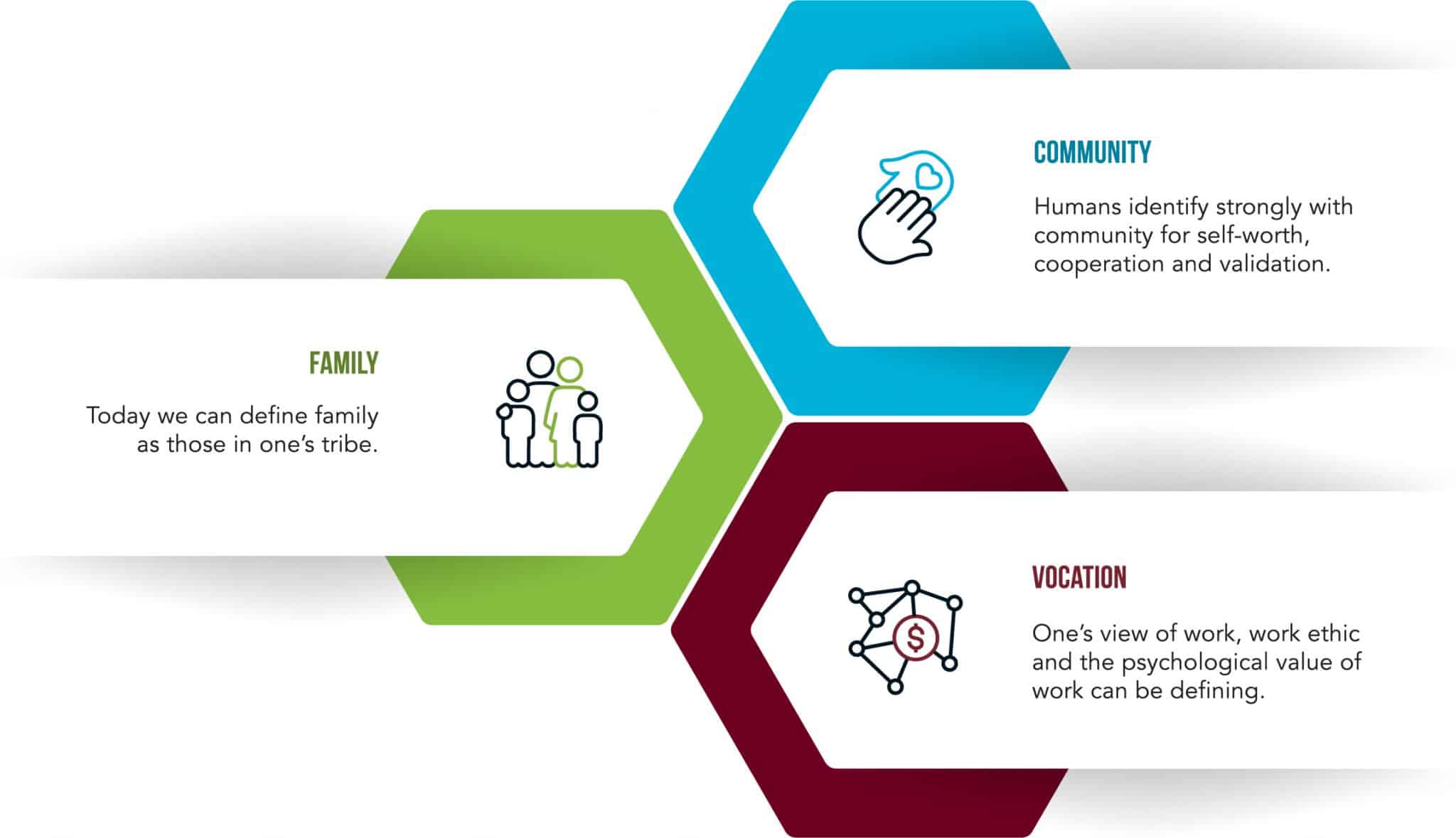Article
Well-Being: Discovering What Matters Most

The Path to Becoming
“The two most important days of your life are the day you are born and the day you find out why,” wrote Mark Twain. Mark Twain discovered what many spend a lifetime searching for: he was here to do some good in the world. We draw significance from our experiences and seek purpose for our lives. This is part of meaning-making, a natural human tendency. And, much like the snowflakes that dot the landscape, we are formed individually. Our experience, our values and our innate gifts shape how we view the world, what matters to us and how we decide to show up in the world. “Tell me, what is it you plan to do with your one wild and precious life,” wrote American Poet Mary Oliver. Indeed, we continually review our life purpose and at critical moments, we ask why we are here and what we are meant to do. Every choice we make leads us either toward (or further from) becoming the person we were meant to be. Who are we as emerging professionals, as spouses, parents or as adult children to parents in need? What do we intend to do as midlife professionals or retirees? How do we deal as people experiencing the limitations of age, changes in physical ability or after the heartbreak of loss? In the questioning, we frame the exploration. Becoming who we are meant to be continues throughout our lives.
Understanding Community, Family and Vocation
When we are at our best, applying our energies to what matters to us, the natural result is greater fulfillment. It takes intention and focus to align our time and energy with our personal values. Even when we seek change, it doesn’t come easily to us; people need help getting there. And that begins with an exploration of their unique Network Profile or how we connect to one another.

We all seek to be understood for exactly who we are. Before retiring from The Oprah Winfrey Show, Oprah had interviewed more than 30,000 people. In that time, she observed that every one of them, from everyday people to rock stars and presidents, had a universal need for validation. Each person wanted to know, “Can you see me? Can you hear me? Does what I say matter to you?” [i] Job One of a trusted advisor is to understand what matters to your client and affirm that they matter. When you explore the three parts of the Network Profile, the repository of personal information for each valued client, you will have specific information to validate each client’s uniqueness and to walk alongside them. Simply defined, the Network Profile is comprised of three parts: Community, Family and Vocation.
Community
Humans identify strongly with community for self-worth, cooperation and validation. We are not meant to operate alone. We find communities by pursuing our interests (golf, yoga, books), values (helping, giving, organizing) and by proximity (neighbors, fellow worshippers, school chums). Modern communication often distances us from a full sense of connectivity with others. This causes us to feel loneliness, isolation and, some would say, a growing social-capital deficit. In isolation, we throw up walls to protect ourselves where loneliness can fester. Staying closed off and showing only parts of ourselves, we mask our vulnerabilities, faults and fears. Is this any way to achieve our highest purpose? In fact, when we open up, we find communities are naturally formed and readily available. As someone recently observed, in order to be counted, one needs to be counted on — and that’s at the very center of community.
Family
Family is often defined as the group of people you are related to either by blood or by marriage….but not always. Spouses, children, grandchildren, parents, siblings – these comprise the traditional family definition. Family has been more broadly defined over the past few decades. Today we can define family as those in one’s tribe; that is, who we (and the client) consider family, such as dear friends, ex-spouses, in-laws, stepchildren, step-grandchildren and others. A wide range of assumptions may be built into anyone’s definition of family. Family members may be dependent on each other – not in a negative way – but in any number of ways unique to that family. It’s these dependencies which bind the relationships together. A family may boost the morale of its members, support them in times of illness or setback, and perhaps offer financial or moral support or simply an invitation to holiday dinners. Learn what connects them and how they span across generations and geography. People often have connected, lively and caring family networks that are not limited to the family tree and are worth probing.
Vocation
We cannot assume we know how a client views vocation. Of course, the traditional view of work might call up a job working 9-to-5 on weekdays. The influences of multiple generations have turned traditional views of work on their head. Life after work has been redefined by trends including longer life spans in retirement, the rise of the gig economy, recognition of the merits of work-life balance. People of various ages are recalibrating and reshaping the way we work. Explore the broader topic of a client’s vocation with an open mind. You may probe work dynamics (how they feel about work), avocation (what they would do without work), learning (the value they place on lifelong learning) and transition (any meaningful life changes they face). One’s view of work, work ethic and the psychological value of work can be defining and are therefore important to understand. Life after work can include a series of activities that look a lot like paid work to others, such as serving on boards, managing one’s investments, enrolling in classes or pursuing new credentials. Others may retire from a vocation and pivot toward activities that provide a different sense of purpose. At each stage of life, the desire to fulfill one’s purpose is individually defined based on values and preferences.
Understanding a Client's Network

How an individual defines, connects or values relationships within communities, families and vocations is determined through their network. The network profile hints at the sources of meaning in our lives, our understanding of the world and where we belong in it. Our community, family and vocation – everything from how we define and relate to family, to the hobbies we cultivate and the role of work in our lives – predict our values. By exploring these networks, we begin to understand the positive and negative influences that shape an individual’s experience. An advisor who collaborates or supports a client’s network will build deeper connections around that client’s values, intention and purpose. These insights can take the conversation to greater depths of significance and deepen the connection to the client’s values. Perhaps a client has only shown us the part of her network she wants us to see. She may be closer to her sister’s children than you know. Our own lens is too narrow to see the full range of a client’s interests and relationships. Our field of vision may be crowded by the task at hand or clouded by unconscious bias and stereotypes. Further, we are prone to judgments by overlaying our own experience on what we may think the client is all about. It is easy to miss something fundamental about what matters most to that person until we understand their Network Profile.
The Beauty That Remains
After an executive sold the only company he’d ever worked for, he let go of his life’s work and began a new chapter. He had amassed wealth, built a livelihood for thousands of employees and became known and respected in his industry. His time, energies and thoughts revolved around the growth and success of his company throughout his career. Though he sold his company, he retained riches of another sort: the community, family and vocational interests that emerged as an entrepreneur, family man and influencer. These permanent assets are part of his identity that cannot be separated and sold. As he steps away from ‘running the show,’ he will draw from his network profile to replace work. Will he turn up on the board of a business school or will he mentor and invest in young companies? Time will tell.
What Makes Life Meaningful?

A recent Pew Research study asked nearly 5,000 Americans, “What about your life do you currently find meaningful, fulfilling or satisfying? What keeps you going, and why?” Most people said family was first among the sources of meaning. After that, the values/interests varied considerably. When asked an open-ended question about where they derive meaning and satisfaction, one-third bring up their career or job, nearly a quarter mention finances or money, and one-in-five cite their religious faith, friendships, or various hobbies and activities. Being in good health, living in a nice place, creative activities and learning or education were commonly cited. A minority mentioned doing good and belonging to a group or community. [ii] Americans with high levels of household income and educational attainment are more likely to mention friendship, good health, stability and travel.[iii] Of course, each person is unique and the Pew study inspires curiosity. The study invites us to explore how each of our valued clients may approach these questions.

The two most important days of your life are the day you are born and the day you find out why.
Why Motives are Worth Knowing
Understand the motives driving a client’s action. In his book Start with Why: How Great Leaders Inspire Everyone to Take Action, Simon Sinek theorizes that when we can communicate our beliefs authentically, we can form the bonds that empower us. A natural part of any relationship progression is the feeling of being deeply understood. According to the foundational theory in interpersonal communications, Mark Knapp, professor and researcher at University of Texas in the 1970s, there are five stages of progression in any kind relationship: initiation, experimentation, intensifying, integration, and bonding. [iv] Here’s how the Knapp construct applies in an advisor-client relationship:
- Initiation — Most advisors excel in meeting up, stage one or initiation. A first meeting or introduction leads to respectful conversation, perhaps avoiding personal topics.
- Experimentation — Advisor and client are getting acquainted in stage two deciding whether or not to work together.
- Intensifying – Discovery has intensified, the papers are signed and the client is on board.
- Integration – The stage described as “deep level of commitment and emotional investment” is actually deeply felt when achieved. You are getting to know what matters most.
- Bonding – Finally, there is bonding, described as the utmost closeness and commitment that cannot easily be broken. [v]
To be honest, too many of our relationships stall at stage three or four, when the relationship produced a result that allows the account relationship to begin. It’s too easy for an advisor to assume they have solidified the relationship simply because the client chooses them as their advisor. Viewing the stages, Knapp’s theory reveals that there is more to be done at that point to win greater confidence and deepen trust, such as uncovering shared values, common interests and other similarities. Either the client or the financial advisor may resist making an emotional investment or throw out self-protection mechanisms; these are all-too-common obstacles for going deeper.
Whether a client puts up walls or resists disclosure or the advisor is reluctant to explore personal topics, the formation of trust is thwarted without deeper emotional investment. We confide in those we trust, who have progressed through the stages of the relationship. How would you rate your ability to progress to a deeper level of commitment and mutual emotional investment with your clients? And, have you considered that bonding with your clients is required to develop the closeness and commitment that others cannot easily intrude upon? In other words, deepening the emotional bond and demonstrating your interest in their well-being and overall lives is essential to maintaining client relationships. How might you cultivate more of those conversations? The answer may lie in adopting the Network Profile into your practice, which First Clearing first introduced in the white paper, The Next Frontier: Conversation, Connection and Confidence.
The Network Profile Holds The Key
Understanding the Network Profile will lead you to guide a client toward his or her more authentic self and help you grow together. Their values, influences, interests and relationships contribute to mapping their decision-making. The Network Profile is the roadmap for understanding the “who,” allowing the advisor to progress to a deeper bond and gain insight to exploring the client’s well-being. What if it is the clients’ desire to make a difference to their family or community, to leave behind a set of values as their legacy and their footprint?
How To Approach the Profile
You can populate a client’s Network Profile over time. Make it a practice to go deeper to uncover the source of an individual’s beliefs and affiliations in order to understand the full picture. Ask probing questions that begin with what and how:
- What’s next for you?
- How are you approaching the next phase?
- What does life after work look like?
- What do you daydream about?
- What’s happening with….?
Get curious with their answer.
- How might you go about exploring that?
- Tell me more about that…
- Why not?
- What would it mean to you to do that?
Take your cues and read the client’s responses and their body language.
- Are they enjoying the questioning? Continue.
- Do they look to be struggling? Demonstrate your interest and ask to set another conversation to explore further.
- If they are in go-forward mode, continue to explore a topic a little deeper with more open-ended questions or follow up. Then continue to offer resources to explore, inform or address unknown aspects of their interest.
Conversation Ignites Action
There are few people in a client’s life who are positioned to have conversations about meaningful personal topics. Your interest may meet their longing to talk as they mull over an adventure or sort through next steps. There is great value in having a meaningful conversation about unformed initiatives. You nourish the psyche by exploring the dialogue. Don’t worry if no decisions are made in the moment or if the client can only reveal a few details of his thinking. You demonstrate care and relationship by going further in discovery than they have before, navigating the questions, listening intently. Who else knows the client well enough to help them discover greater fulfillment? George Kinder, founder of the Kinder Institute, and author of Lighting the Torch, the Kinder Method of Life Planning, observes that each of us carries within our hearts a “dream of freedom” where lives feel fulfilled and are truly worthwhile. Financial advisors offer clients the most comprehensive opportunity to discover and integrate a financial life plan that melds meaning with money. No other professional can help unveil the client’s most profound dreams and values, and then articulate a financial strategy that empowers successful implementation. He calls the moment of realization of life purpose, the lighting of the torch. [vi] We all need people in our lives who remind us of the promises we make to ourselves and reinforce us in being the best we can be. As trusted ones, you can bring a deeper level of care to all areas of your clients’ lives, including inspiring their dreams and a higher sense of purpose, holding them accountable to their own values and practicing “radical caring” for their well-being.
Sources [i] The Oprah Winfrey Show [ii] Pew Forum (The open-ended question was included in a survey conducted Sept. 14 to 28, 2017, among 4,867 U.S. adults on the American Trends Panel.1 The question asked, “We’re interested in exploring what it means to live a satisfying life. Please take a moment to reflect on your life and what makes it feel worthwhile – then answer the question below as thoughtfully as you can. What about your life do you currently find meaningful, fulfilling or satisfying? What keeps you going, and why?”) [iii] Ibid. [iv] Knapps Model of Interaction Stages [v] Knapps Model of Interaction Stages [vi] George Kinder, CFP & Susan E. Galvan, Lighting the Torch, the Kinder method of Financial Planning, FPA Press, 2006.
This material was co-authored by First Clearing and LederMark Communications & Coaching, a communications and consulting firm in the financial advice business. It has been prepared and distributed solely for information purposes.